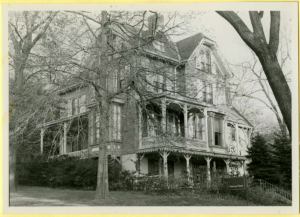A conversation with up-and-coming London record producer G
November 3, 2017

by: Jamie Wiggan, Culture Editor
Earlier this week I had the pleasure of talking with London-based songwriter and producer who—whether out of modesty or for enhancing his artistic mystique—asked to be referred to simply as “G” (don’t worry, his fashionably ruffled locks and smooth estuary English suggest that this probably isn’t some highly unimaginative attempt to project the image of a gangster). Along with identical twin, “H”, G makes up one half of the beat-infused, falsetto-led electronic duo, The 23rd.
Since their first single was released in 2013— then under the stage name Oceaán—their eclectic brand of ambient dance music has captured listening ears across native Britain and the European continent; it was on the back of this success that the twins were approached by Sony-ATV to write music in collaboration with other up-and-coming artists.
Between busy studio sessions, G kindly found the time to talk about his journey as a young musician; he also shared some insights into the workings of the contemporary music industry and gave his views on where things are heading.
“It started with H getting a guitar for a birthday present when we were young and then I subsequently got a drum kit a year after or so . . . that’s where we found our love for collaboration over working as solo artists,” G said.
Although they attended different high schools and universities by choice, at least as far as their life in music is concerned, G always talks in terms of “we”. He then goes on to talk about how they cut their teeth playing in “guitar bands” before they received—this time as a Christmas present—early notebook computers with recording software. Initially, they recorded “simply because we wanted to hear ourselves played back”, but over time the production side began to occupy the forefront of their musical attention.
Hearing of the impressive unity of the twins’ musical progression nudges me to ask whether they had ever drifted apart artistically. Other sources have told me that during their early teens H went through a Hardcore metal phase, while G was getting down to Eminem and Snoop Dog. And while fans of their current repertoire may let out a chuckle of endearment as they read this, according to G a later stylistic conflict played a defining role in establishing their signature sound.
During their time as undergrad students, while they were living at opposite ends of the country, G reflects how him and his brother’s music tastes influenced their band’s sound.
“H was listening to kind of like. . . more club music, whereas I was listening to more kind of Indie, maybe Shoe-gazy stuff. . . and I guess what Oceaán was anyway, was the fusion of that. . . essentially electronic stuff with a dreamy bed,” G said.
Continuing his story, G shares that Oceaán began during the twins’ final years of university as they worked on tracks remotely, which they would then share digitally and develop through collaboration. After uploading the finished works to SoundCloud, things quickly took off, and they quite naturally rekindled their relationship with a former manager who, just months previously had led them to moderate success fronting a surf-pop band. Soon after, they were approached with a publishing offer they couldn’t refuse.
“That was what enabled us to move down to London and be able to do this full-time,” G said.
If this all just sounds like another realized pop star fantasy of being whisked from obscurity into stardom overnight, G’s story is refreshing in its realism.
“There was a period of time where we were just producing on our own . . . we just spent so many hours in the studio independently figuring out how to use the software, before we were in a position to be able to do it professionally,” G said.
Even now, it is clear that a lot of graft goes into meeting the demands of their publisher. G breaks down a typical studio session for me.
“You’ll have either an artist and just a producer; or you might have what’s called a top-liner who works on. . . solely the melody and the lyrics: we do both of that, but we like to have a top-liner as well because it can bring the atmosphere in the room up.
“A lot of time outside the session is made up of different tasks; we might be comp-ing the vocals on one track while making changes to another. . . there’s always a constant flow to the work. . . and there’s always the constant battle of starting something new and finishing something else off,” said G.
At this point I decide to steer the conversation back towards more idealistic territory. I note how both G and H received Bachelor of Arts degrees in classical music from prestigious British universities, and ask whether there has ever been a perceived conflict between their classical training and their work in popular music.
“There’s actually so many minute creative decisions that go into creating a pop song and it really does piss me off when people overlook that… There are so many ways in which you can express yourself artistically with Pop music,” G said. “The most obvious example is through lyrics; it is our role to take the concepts and ideas that an artist may have and compile it into a coherent song format that isn’t just a stream of consciousness – (although sometimes that works! Take, Alessia Cara’s ‘Here’). I genuinely believe though that Pop music as one of the most important forms of artistic expression within modern society.”
Picking up on the description he gives of his role as a producer working in partnership with the artist, I ask G if he can share about any artists he particularly enjoys working with.
“Recently. . . I’ve really enjoyed working with Sigrid, she’s from a small town in Norway, but her EP that has just come out has done really well and she seems to be a really straight-up character who’s totally involved in the process, and into music just generally. Grace Carter as well is another person we’ve worked with… who we’ve become really good friends with which has been nice… I think both of those artists have great futures ahead of them,” G said.
Talking of bright futures, I ask G to draw things to a close by giving his take on where he sees mainstream music moving in the future.
“I think that lyrical content is the ever-changing variable in pop music. Specifically, we seem to be in a time where lyrics are as colloquial as ever and a full ’story’ isn’t actually necessary . . . Like the lyrical trends, it is the same with the music and more specifically the production,” G said.
“It just takes a unique, fresh track to become a hit and suddenly everybody is inspired by it,” G said. “I expect to see the charts including other ‘underground genres’. Take Grime [a form of underground hip hop originating in East London] in the UK for instance… Grime records are getting to number one, which I think is amazing… Drake’s More Life was heavily influenced by the UK scene. I guess I expect for artists, producers, and writers to continue being bold and fresh.”





